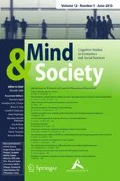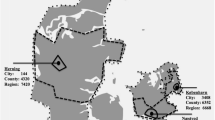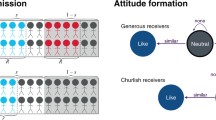Abstract
ChickenHawk is a social-dilemma game that distinguishes uncoordinated from coordinated cooperation. In tests with players belonging to a culturally homogeneous population, natural-language “cheap talk” led to efficient coordination, while nonlinguistic signaling yielded uncoordinated altruism. In a subsequent test with players from a moderately more heterogeneous population nearby, the “cheap talk” condition still produced better coordination than other signaling conditions, but at a lower level and with fewer acts of altruism overall. Implications are: (1) without language, even willing cooperators coordinate poorly; (2) given a sufficiently homogeneous social group, language can coordinate cooperation in the face of opportunities for anonymous defection; (3) coordination therefore depends not on merely a general propensity to cooperate but on the overlap of social identities, which are always costly to acquire and maintain. So far as linguistic variation establishes how much social identities overlap, natural-language “cheap talk” is self-insuring, suggesting that linguistic variation is itself adaptive.

Similar content being viewed by others
References
Baker M (2004) Linguistic difference and language design. Trends Cogn Sci 7:349–353
Brandt H, Hauert C, Sigmund K (2003) Punishment and reputation in spatial public goods games. Proc R Soc Lon B 270:1099–1104
Camerer C (2003) Behavioral game theory: experiments in strategic interaction. Princeton University Press, Princeton
Kings-Casas B, Tomlin D, Anen C, Camerer C, Quartz S, Montague P (2005) Getting to know you: reputation and trust in a two-person economic exchange. Science 308:78–83
Komarova N, Nowak M (2003) Language, learning, and evolution. In: Christiansen M, Kirby S (eds) Language evolution. Oxford University Press, Oxford, pp 317–337
Miller A (1976) The crucible. Penguin Plays, New York City
Milinski M, Semmann D, Krambeck H (2002) Reputation helps solve the “tragedy of the commons”. Nature 415:424–426
Nowak M, Sigmund K (1998) Evolution of indirect reciprocity by image scoring. Nature 393:573–577
Pinker S (1994) The language instinct. Harper Collins, New York City––(1998) Words and rules. Lingua 106:219–242
Sally D (1995) Conversation and cooperation in social dilemmas. A meta-analysis of experiments from 1958–1992. Ration Soc 7:58-92
Zahavi A, Zahavi A (1997) The handicap principle. Oxford University Press, Oxford
Acknowledgments
Thanks to my undergraduate research assistants, Jeffrey Barth and Carrie Robinson, for administering the classroom replications, and to Doug Jones, of the University of Utah, for alerting me to Baker’s work.
Author information
Authors and Affiliations
Corresponding author
Rights and permissions
About this article
Cite this article
Jeffreys, M. How can “cheap talk” yield coordination, given a conflict?. Mind & Society 7, 95–108 (2008). https://doi.org/10.1007/s11299-007-0042-6
Received:
Accepted:
Published:
Issue Date:
DOI: https://doi.org/10.1007/s11299-007-0042-6




